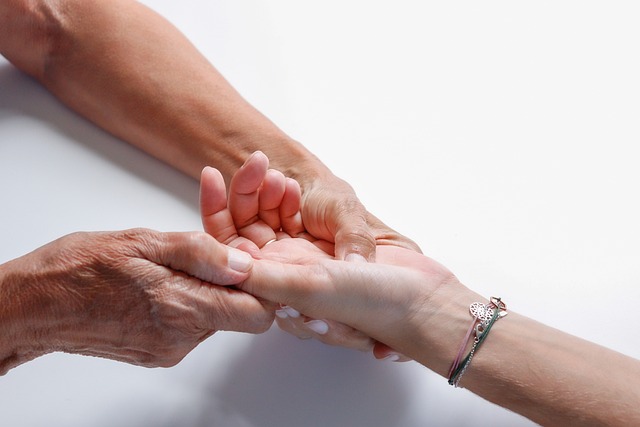First responders facing Post-Traumatic Stress Disorder (PTSD) require specialized treatment for managing symptoms and maintaining resilience. Early intervention is key, utilizing evidence-based therapies like Cognitive Behavioral Therapy (CBT), Eye Movement Desensitization and Reprocessing (EMDR), exposure therapy, and group therapy. CBT reframs negative thoughts, while EMDR reprocesses traumatic memories. Alternative therapies, such as art and music therapy, offer holistic healing alongside traditional treatments. Building resilience through CBT and peer support networks empowers first responders to cope with PTSD effectively. Resources are available through online platforms, local NAMI chapters, and community mental health centers to ensure tailored care for first responders' PTSD.
First responders—police officers, firefighters, and paramedics—face high-stress situations daily, increasing their vulnerability to post-traumatic stress disorder (PTSD). This article explores comprehensive PTSD therapy options tailored to their unique needs. We discuss symptoms, challenges, and evidence-based treatments like Cognitive Behavioral Therapy (CBT), Exposure Therapy, EMDR, group therapy, and alternative therapies. Early intervention is emphasized for effective recovery. Discover strategies for resilience building and access valuable resources for managing PTSD, offering hope and support to these brave individuals.
Understanding PTSD in First Responders: Symptoms and Challenges

PTSD, or Post-Traumatic Stress Disorder, is a common yet profound condition among first responders who frequently encounter high-stress, traumatic events. Symptoms can manifest in various ways, from intense flashbacks and nightmares to persistent feelings of anxiety and heightened arousal. The unique challenges they face include reliving distressing memories, avoiding situations that trigger these memories, and experiencing negative changes in thoughts and mood.
First responders may struggle with the emotional toll of their work, leading to potential social and occupational impairments. Accessing appropriate PTSD treatment is crucial for managing these symptoms and promoting resilience. With specialized therapies, first responders can learn coping strategies, process traumatic memories safely, and regain a sense of control over their lives.
The Importance of Early Intervention for Effective PTSD Treatment

Early intervention is crucial in effectively managing Post-Traumatic Stress Disorder (PTSD) among first responders. The immediate aftermath of a traumatic event presents a critical window for potential recovery, making timely access to specialized PTSD therapy essential. First responders, such as police officers, firefighters, and paramedics, frequently encounter high-stress situations that can lead to the development or exacerbation of PTSD symptoms.
Prompt recognition of these symptoms and subsequent engagement in evidence-based therapies, like cognitive-behavioural therapy (CBT) and eye movement desensitization and reprocessing (EMDR), have been shown to improve outcomes. Early intervention allows individuals to process traumatic memories and develop coping strategies, preventing the deepening of PTSD and associated difficulties in daily functioning.
Cognitive Behavioral Therapy (CBT): A Popular Approach for PTSD Recovery

Cognitive Behavioral Therapy (CBT) is a widely recognized and effective approach for Post-Traumatic Stress Disorder (PTSD) recovery, especially among first responders. This therapy focuses on identifying and changing negative thought patterns that can develop after traumatic events. By challenging and replacing distorted beliefs with more realistic and balanced ones, CBT helps individuals manage symptoms of PTSD such as anxiety, depression, and flashbacks.
The process involves teaching coping strategies to help first responders navigate their experiences and emotions in a healthy manner. Through structured sessions, they learn to recognize triggers, face fears, and develop effective problem-solving skills. CBT encourages active participation, enabling individuals to take control of their recovery journey. This evidence-based method has shown remarkable success in helping first responders process trauma, regain a sense of control, and improve overall well-being, making it a preferred choice for PTSD treatment.
Exposure Therapy: Facing Fear to Overcome PTSD

Exposure therapy is a powerful technique within PTSD treatment, specifically designed to help first responders confront and overcome their traumatic experiences. This therapeutic approach encourages individuals to gradually and safely engage with memories or stimuli linked to the trauma. By repeatedly revisiting these triggers in a controlled environment, patients can learn to manage their fear and anxiety responses. The goal is to desensitize them to the traumatic event, allowing them to process and resolve the associated emotions.
Through exposure therapy, first responders can face their fears head-on. They learn coping strategies to manage intense feelings and flashbacks, eventually gaining a sense of control over their PTSD symptoms. This method empowers individuals to take back power from the trauma, leading to significant improvements in their overall well-being and quality of life.
Eye Movement Desensitization and Reprocessing (EMDR) Technique for PTSD Treatment

The Eye Movement Desensitization and Reprocessing (EMDR) Technique is a groundbreaking approach in PTSD treatment, specifically designed to help first responders process traumatic memories. This therapy involves a unique combination of eye movements, or bilateral stimulation, alongside the patient’s recall of distressing events. The bilateral stimulation can be achieved through side-to-side eye movements, taps, or tones, encouraging the brain to reprocess and reframe the traumatic memory.
EMDR helps patients to reduce the emotional intensity associated with their trauma, allowing them to gain a new perspective on the event. This process facilitates a deep level of relaxation while accessing and reworking distressing memories, which can lead to significant improvements in PTSD symptoms. The technique is known for its effectiveness in helping first responders manage flashbacks, nightmares, and intense emotions triggered by reminders of past traumatic experiences.
Group Therapy Sessions: Benefits and Support for First Responders with PTSD

Group therapy sessions play a pivotal role in PTSD treatment for first responders, offering unique benefits tailored to their specific needs. By sharing experiences and connecting with peers who understand their struggles, individuals can foster a sense of belonging and reduce feelings of isolation often associated with PTSD. This supportive environment encourages open dialogue, allowing first responders to process traumatic memories, share coping strategies, and gain valuable insights from one another.
Moreover, group therapy provides a platform for peer-to-peer support, where members can offer encouragement and understanding. It enables first responders to learn from each other’s resilience and recovery journeys, promoting a sense of community and collective healing. These sessions are designed to create a safe space where individuals can confront their PTSD symptoms in a controlled and supportive manner, ultimately contributing to enhanced mental health and improved coping mechanisms.
Alternative Therapies: Exploring Art, Music, and Animal-Assisted Programs

For first responders dealing with PTSD, exploring alternative therapies can offer new paths to healing alongside traditional treatments like counseling and medication. Art therapy provides a unique outlet for expressing trauma in a safe, creative space. Creating art allows individuals to visually represent their experiences, process emotions, and gain a sense of control over their healing journey. Similarly, music therapy engages the brain’s emotional centers, offering a powerful means to reduce anxiety, improve mood, and enhance overall well-being. The rhythm and melody of music can help first responders calm their minds and reconnect with themselves on a profound level.
Animal-assisted programs are another promising avenue for PTSD treatment. Interacting with animals has been proven to lower stress hormones and create a sense of comfort and companionship, which can be particularly beneficial for those struggling with isolation and social anxiety stemming from trauma. These alternative therapies complement traditional PTSD treatment by addressing the whole person—mind, body, and spirit—and fostering resilience in the face of adversity.
Building Resilience: Coping Strategies for First Responder Mental Health

Building resilience is a key aspect of coping strategies for first responders dealing with mental health challenges, particularly Post-Traumatic Stress Disorder (PTSD). These professionals often encounter high-stress situations, and effective coping mechanisms are essential to enhance their well-being. One powerful tool in their arsenal is cognitive-behavioral therapy (CBT), which helps reframe negative thought patterns associated with traumatic events. By identifying and challenging distorted cognitions, CBT enables first responders to develop healthier perspectives, reducing the impact of PTSD symptoms.
Additionally, peer support networks play a vital role in fostering resilience. Sharing experiences and connecting with peers who understand their struggles can provide comfort and valuable insights. Many first responders find solace in group therapy sessions where they can openly discuss their traumas, fears, and coping strategies while receiving emotional support from their peers. This sense of community not only offers immediate relief but also empowers them to face challenges head-on, ultimately strengthening their mental fortitude.
Resources and Support Networks for Effective PTSD Management

First responders, including police officers, firefighters, and paramedics, often face unique challenges on the job that can lead to post-traumatic stress disorder (PTSD). Accessing effective PTSD treatment is crucial for their well-being and ability to serve their communities. Thankfully, a range of resources and support networks are available to help these individuals manage their symptoms.
Online platforms and local chapters of organizations like the National Alliance on Mental Illness (NAMI) provide valuable information and peer support. Many professional therapy services specialize in PTSD treatment tailored to first responders, offering evidence-based therapies such as Cognitive Behavioral Therapy (CBT), Eye Movement Desensitization and Reprocessing (EMDR), and group therapy sessions. Additionally, veteran’s affairs departments and community mental health centers often have dedicated programs for first responders facing PTSD, ensuring they receive the specialized care they need.
